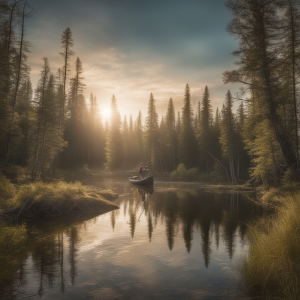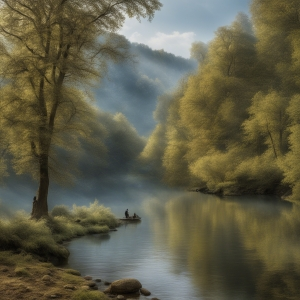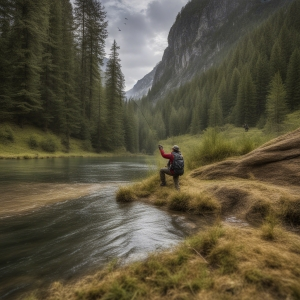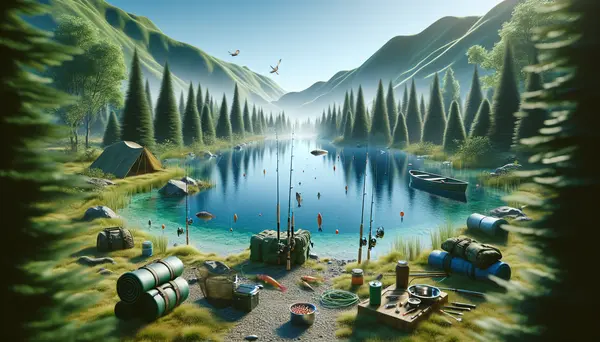Table of Contents:
Introduction: The Allure of Backcountry Fishing
Discovering the wonder of the outdoors is a liberating experience. When you combine this with the thrill of fishing, the adventure intensifies. Backcountry fishing takes these stronger outdoor sensations and multiplies them, making every trip a adventure of exploration. It's not about just hopping to a nearby river with your regular gear. It's about journeying into remote areas, where nature is untouched and you barely see another human soul. It's about expanding your fishing horizons, challenging your skills in remote and untouched waters. For those willing to go the extra mile, the reward can be an unforgettable experience.
In this article, we will guide you through the stunning world of backcountry fishing, covering the basics, the challenges, and the thrill of veering from well-travelled paths. Whether you're a seasoned angler or just starting your journey in the fishing world, this guide to backcountry fishing adventures may just spell the start of your next big adventure.
Why Explore Remote and Untouched Waters
There's something incredibly appealing about tossing a line in a location where few have fished before. You're surrounded by untouched nature, far from ordinary hustle-bustle, feeling a sense of discovery and adventure. The anticipation of what might be lurking beneath these lesser-known waters can make every cast exciting.
Additionally, fishing in remote locations often gives you the opportunity to catch species that you wouldn't find in more frequently-frequented fishing spots. Whether it's a species known as local to the region, or a rare surprise, it definitely adds to the thrill.
Remote fishing is not just enjoyable but also immensely rewarding. Just imagine, standing in the middle of nowhere, casting your line, and making a catch! It's you against nature, against the unknown, and each successful catch is a testament to your skills and adaptability.
Most importantly, backcountry fishing teaches the importance of conservation. Angling in amidst untouched ecosystems increases an appreciation for preserving these pristine settings for future generations.
Pros and Cons of Backcountry Fishing Adventures
| Pros | Cons |
|---|---|
| Access to remote and untouched waters | Potential risks in remote locations |
| Chance to catch rare and unique species | Requires a high level of preparation and planning |
| Opportunity for adventure and exploration | Possibility of encountering dangerous wildlife |
| Peaceful and quiet fishing experience | Difficult to access medical help in case of emergencies |
| Away from crowded fishing spots | Requires more fishing skills and knowledge |
Necessary Equipment for Backcountry Fishing Adventures

Backcountry fishing requires specific gear due to its unique and sometimes harsh conditions. Here's what you'll need to ensure a successful fishing trip in the wilderness.
First, a lightweight fishing rod that's easy to carry and handle is crucial. The compact design will make it more transportable during your hike into the remote locations.
Next, you'll need a selection of bait and lures suitable for various fish species. If you're not sure what type of fish you'll encounter in your chosen backcountry location, take a mixed selection. Also, don't forget a reliable fishing line cutter or multi-tool.
Your tackle box should be lightweight and waterproof. A minimalistic approach will serve you best in the backcountry, so only take the essentials.
Finally, it's crucial to have a sturdy backpack to transport your gear. Choose one with comfortable straps and plenty of compartments for storing your fishing gear and all necessary supplies for a day or two in the wilderness.
Remember, in remote locations, help can be miles away. So make sure you also pack a basic first aid kit, an emergency whistle, and other safety gear like a map or compass. And, of course, you'll need appropriate clothing and camping gear if you plan to stay overnight.
Safety Aspects in Backcountry Fishing
When delving into the beauty of remote fishing, your safety is paramount. The environment can be unpredictable, and you are typically not within immediate reach of emergency services. Here are some key safety aspects that are important to know and follow while you're on a backcountry fishing adventure.
Staying hydrated is crucial for your health and energy, especially in remote, demanding environments. Always carry a good supply of fresh drinking water when out for fishing. Carry equipment that can help you filter and purify water from freshwater sources.
Always keep a detailed map of the area in case your electronics fail. A compass can be a lifesaver in an unfamiliar territory. Avoid wandering off marked paths and always be aware of your surroundings.
Weather can change rapidly in the backcountry, so stay informed about the weather forecast. Sudden storms can create dangerous conditions quickly. Also, be mindful of the wildlife in the area. Some animals might see you as an intruder, so know how to react when encountering local wildlife.
If you’re venturing out alone, make sure someone knows where you’re going and when you expect to return. This is a simple safety measure that can have huge benefits in case of an emergency.
Lastly, take care of the environment. Leave no trace behind other than your footprints. Pack out all your trash and respect the local flora and fauna. The untouched nature of backcountry regions is what makes them special, and it's our responsibility to keep them that way.
Tips and Strategies for Successful Backcountry Fishing

Backcountry fishing is a unique experience, but it does require some different approaches to regular fishing. To boost your success, we've got some important tips and strategies you should follow.
1. Research Your Destination: Before setting off, research your chosen area thoroughly. This includes checking the type of fish found there and their specific behaviors. Knowing what you might catch can help you select the right bait and lures.
2. Pack Light, But Wisely: In the backcountry, you need to balance between carrying essentials and not overloading yourself. Select lightweight gear and only pack what’s absolutely necessary. A lightweight tent, sleeping bag, and cooking gear are essential if you plan to stay overnight.
3. Be Adaptable: The unpredictable nature of backcountry fishing requires flexibility. Be ready to adapt to changing situations – this could mean switching your bait type or trying different fishing techniques.
4. Respect Nature: You're a guest in the wildlife's home. Leave no trace behind, respect any animals you encounter and maintain the integrity of the ecosystem.
Utilizing these strategies will not only increase your chances of successful backcountry fishing but also ensure that you have a fun and safe journey.
Environmental Impacts and Respecting Nature
Amidst the thrill of backcountry fishing, we must remember our duty towards nature. Our actions should not harm the pristine setting we enjoy. Here are several practices to minimise environmental impact and respect the nature while on fishing adventures.
Following the principle of 'Leave No Trace' is incredibly important. Make sure to take all wrappers, fishing lines, bottles and any other trash you have accumulated and dispose of it properly. Nature is not a dumping ground, and even the smallest piece of litter can have a harmful effect on local wildlife.
Also, remember to be considerate about where you tread - avoid trampling vegetation or disrupting the underground nesting sites. You are a guest in these remote locations, so it's essential to disturb nature as little as possible.
Always catch and release fish with the utmost care. Handling fish with wet hands can avoid removing their protective slime. This ensures they have a better chance of survival after being released.
Lastly, respect local fishing laws and regulations. These rules are not there to limit your fun, but rather intended to maintain fish populations and habitats. Always adhere to size and possession limits, and respect closed areas and seasons.
In conclusion, backcountry fishing is about more than just the catch – it's the thrill of the adventure, respect for nature and the joy of exploration. Just remember, nature has given us an incredible playground, let's do our part to preserve and protect it for future generations to enjoy.
Conclusion: The Unmatched Thrill of Backcountry Fishing

Heading into the distant lands, exploring untrodden trails, and casting a line into the wild unknown - these are the experiences that craft backcountry fishing adventures. It's a realm where your instincts, skills, and love for nature come together, and each cast can bring an unexpected catch. It's as raw and real as fishing gets, combining the allure of the wilderness with the thrill of the chase.
The untouched waters of the backcountry hold not just fish, but tales, experiences, and lessons that last a lifetime. The journey towards these waters is rewarding, with opportunities for growth, learning and immense satisfaction. It's not just about the catch, but about the adventure that leads to it. From the bustling brooks to the tranquil lakes, each landscape holds a fishing adventure that awaits you.
So, get ready and pack your gear. The untouched waters of the backcountry await, full of potential and mystery. Embrace the adventure, for, in the great outdoors, a fishing rod and an open mind can lead to unforgettable experiences. Following nature's pathways, you're not just exploring waters, but a way of life that echoes the simple, yet profound thrill of fishing in the wild. Remember, it's the journey, not the destination that defines a backcountry fishing adventure. Tight lines!
Frequently Asked Questions: Wilderness Fishing Adventures
What is Backcountry Fishing?
Backcountry fishing is the experience of fishing in remote and untouched waters, often accessed by hiking or boating.
What equipment is needed for Backcountry Fishing?
The essential equipment includes fishing rods and reels, baits and lures, hooks, and fishing line. Also, suitable clothing, camping gear, and navigational items are crucial if you plan on staying overnight.
Can I fish anywhere in the Backcountry?
Not always, many areas require specific permits or are protected ecosystems where fishing is not allowed. Always check local regulations and rules.
What kind of fish can I catch in the Backcountry?
The types of fish you can catch depend on the area, but in general you can find species like trout, bass, catfish and pike in freshwater, and tarpon, redfish, snook in saltwater.
Is Backcountry Fishing safe?
Yes, with proper preparation and following safety guidelines. Always let someone know your trip plan, check weather conditions, and ensure you have navigation and first aid supplies.







